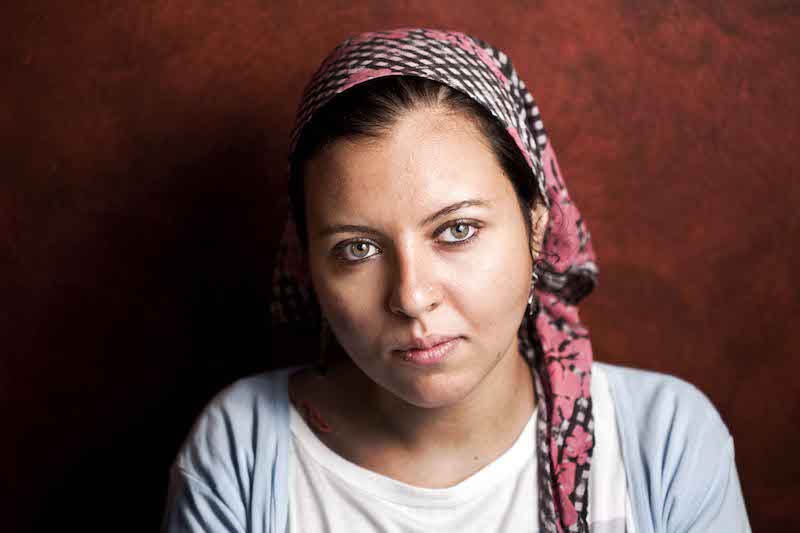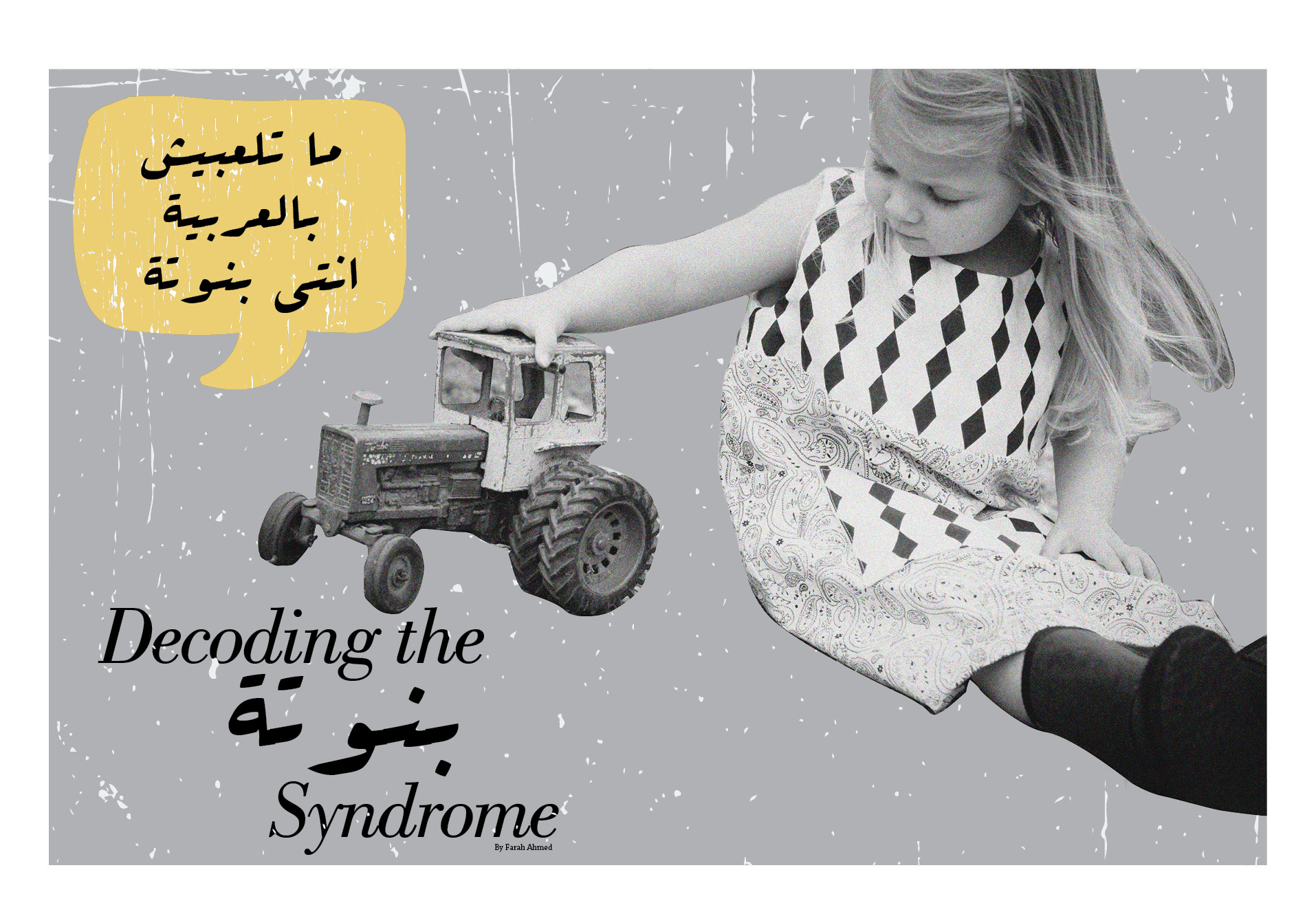Every girl raised into an Egyptian family has heard the phrase “act like a banoota” a million times, whether it’s from her mother, grandmother or even neighbors. What does act like a banoota really mean? It’s simply a stereotype used to tamper with young girls’ self-confidence, and a way to make them feel worthless in a male-dominated society. We’ve become accustomed to using the description of a young female as a “banoota”, which isn’t by any means a compliment –it’s plainly an insulting remark.
Who wrote the book on acting like a “banoota”? What does a “banoota” really look like? Why can’t a young girl wear a dress, and also play football in the street with boys. Why can’t she be a girl who doesn’t like playing with Barbies, and despises the color pink? Society has been dictating gender for decades now, and the world hasn’t noticed it yet. We have made it our mission to debunk the “banoota” myth, by asking different accomplished women what was it like being raised in a world that suffers from the “banoota” syndrome.
Sally Zohny –Egyptian Feminist and Storyteller
“Society defines “banoota” as a shy girl, who doesn’t raise her voice. She listens to every word her mother tells her, and replies with the following statements, “tamam” (okay) and “ma3nadeesh moshkela” (I have no problem),” she says.
Sally used to love playing video games, but she would often hear the words it’s not a game a “banoota” would play. She was constantly asked to act like a “banoota” and wear a dress, or let her hair grow so she can resemble every “banoota” her age.
As we all know, people in Cairo suffer from the “banoota” syndrome, and like any disease it comes with many side effects. “Some girls are 100 percent convinced that the “banoota” concept is completely true. However, there are some who rebel against this stereotypical concept, and try to prove that there is no such thing as “banoota”. On the other hand, some girls believe that acting like a “banoota” is an approach to get a husband –by making the man feel that she’s wife material,” she says.

Sondos Shabayek –Founder of BuSSy Project
Every girl has been pressured at some point in her life to act like a “banoota”, and Sondos was no different. Sondos was told to start acting like a “banoota” by sitting straight, eating with her mouth shut, and combing her hair. “The “banoota” syndrome has a very negative effect on a girl’s freedom to express herself –it restricts her choices and puts her under a great amount of pressure,” she says.
Mothers need to start empowering their daughters, and help them break free from what society has imposed on them. “One way to do that is to accept their daughters the way they are, regardless of how they look or the choices they make. Love them and accept them unconditionally,” she says.

Tuqa Abubakr –Handball Sport Leader at Decathlon Egypt
When it comes to the word “banoota” people integrate it more with how the girl should look. “She has to have long hair or else she would be considered “mestargela” (masculine). She’s forbidden from wearing shorts, because a “banoota” has to wear a dress. Even when it comes to sports, a “banoota” is expected to learn ballet or gymnastics, but not football or karate,” she says. Being the athlete that she is, Tuqa was told not to play football with the boys in the street, not to travel alone, to speak with a lower voice, and to stop cutting her hair short, because that’s not how a “banoota” would act. “Being pressured to act like a “banoota” has affected me tremendously; it made me rebel against the idea to the extent that I feel weird wearing a dress, or even putting on makeup,” she says.

Engy Nabil –Basketball Player
Engy has been pressured by her parents and society to act like a “banoota” her whole life. “In order to show that I am a “banoota” I wasn’t allowed to share my thoughts about a certain topic, or even speak with a loud voice, because that’s what a polite, well-mannered girl would do,” she says. It doesn’t stop here, like any girl, Engy was told a series of commands to make her look more suitable to be a “banoota”. She was told to stop wearing sneakers and start straightening her curly hair more often. “The “banoota” syndrome has definitely affected me –it has made feel insecure everytime I try something I am not really used to doing, like putting on makeup,” she says. “Mothers should not force their daughter to adopt a certain look, or dictate the way they act. Just give them the freedom to make their own choices and build their own character,” she says.

Shahinda Attia –Fitness Coach and Jumping Instructor
Shahinda believes that from society’s perspective, a “banoota” is a girl who doesn’t stay out late at night, doesn’t dress “inappropriately”, and picks a suitable job that’s created for a girl, or else she’s going to be forever haunted by those piercing, judgmental looks. “Every girl born into an Egyptian household has endured the pressure of acting like a “banoota”, just because she belongs to a different gender,” she says. “Mothers should raise their daughters to be more confident, and not force them to be someone they don’t want to be,” she says.
Mothers, you need to stop telling your young girls to act like a “banoota”, and act more like themselves and speak their minds. Just accept them and love the way they are. Don’t try to change them because it’s only going to make things worse. Let them figure out how they want to face the world; creating another copy of you while they’re unhappy isn’t something that would make you either proud or happy. Watching your girl grow and develop on her own is a true success as a parent.

How can mothers empower their daughters?
Mothers give your daughters a break, society is already putting a toll on them. There are many ways to empower your daughter, and nurture her into becoming a happy and confident young woman. Here are ways that you might want to try.
Talk to your daughter
Create a safe environment and engage in an open conversation on a variety of topics. Make her feel that she has valuable thoughts and her opinions matter. Encourage her to speak up, because that’s how a feminist is born.
Expose her to strong female role models
There are many strong and powerful Arab women making a positive impact around the world! They can be women you know or from movies, expose your daughters to what these women had to overcome, and encourage them to become like them.
Respect who she is
Give them space to be themselves. Accept their passions, personalities, and love them no matter what. Don’t try to change them, instead encourage them to make their own choices and speak their minds.
Be her number one fan
No matter how old your daughter is she still needs to feel loved and supported. Always be your daughter’s biggest fan, support her ideas and applaud her accomplishments no matter how small they are.
Teach her to be brave
Let her travel and explore new things, it will teach her to be independent and it will do wonders to her self-confidence.

